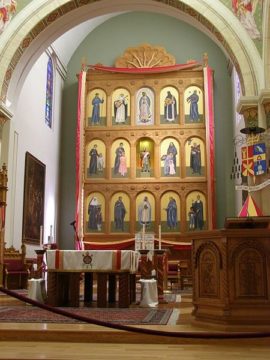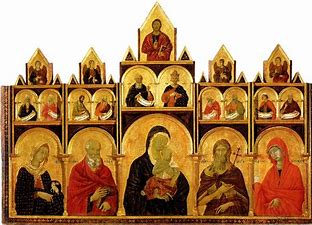The Feast of All Saints is upon us. During this pandemic year, the witness of our saints in heaven and all of us ‘saints in the making on earth’ is our hope. Fr. Paul Gallagher, OFM reflects on today’s Gospel beattitudes. The content is edited by Franciscan Sister of Christian Charity Sister Anne Marie Lom and Joe Thiel. The excerpts from the Sunday readings are prepared by Joe Thiel. To read or download the complete pdf with excerpts for your prayer, please click here Franciscan Gospel Reflection November 1 2020. Excerpts are from the Lectionary for Mass for Use in the Dioceses of the United States of America, second typical edition © 2001, 1998, 1997, 1986, 1970 Confraternity of Christian Doctrine, Inc., Washington, DC. Used with permission. All rights reserved. No portion of this text may be reproduced by any means without permission in writing from the copyright owner.
Matthew 5:1-12a
When Jesus saw the crowds, he went up the mountain, and after he had sat down, his disciples came to him. He began to teach them, saying:
“Blessed are the poor in spirit, for theirs is the kingdom of heaven.
Blessed are they who mourn, for they will be comforted.
Blessed are the meek, for they will inherit the land.
Blessed are they who hunger and thirst for righteousness, for they will be satisfied.
Blessed are the merciful, for they will be shown mercy.
Blessed are the clean of heart, for they will see God.
Blessed are the peacemakers, for they will be called children of God.
Blessed are they who are persecuted for the sake of righteousness, for theirs is the kingdom of heaven.
Blessed are you when they insult you and persecute you and utter every kind of evil against you (falsely) because of me. Rejoice and be glad, for your reward will be great in heaven.
Background:
The readings for The Solemnity of All Saints are especially chosen for this celebration.
In Matthew’s gospel, this text is from his description of Jesus’ early ministry. Jesus has chosen four to be his apostles, Andrew and his brother Peter, and two other brothers, James and John. Jesus has been in the synagogues proclaiming the reign of God and curing people. With the spread of his reputation, more people are coming to hear him. In the first verse of the text, Matthew states that Jesus took his disciples apart from the crowd to teach them privately.
Being a follower of Jesus means more than traveling with him. Jesus expects the disciples to learn from him and to shape their lives by his teachings. As Matthew describes Jesus’ instruction to his followers, he is drawing on his community’s familiarity with Moses, who went up the mountain and brought back the commandments from God. Here, Jesus takes his disciples up the mountain and sits with them, assuming the position of a teacher. He is laying down a new set of commandments. These commandments encourage behavior that brings a sense of satisfaction and fulfillment and discourages those things that are destructive. Certainly, what he advocates is contrary to the prevailing attitudes of the day. In the wisdom tradition, Jesus presents a way of life that one is to strive after, rather than laws to be obeyed.
The values that Jesus advocates in the beatitudes run contrary to those held by society in general. Throughout Matthew’s gospel, Jesus is described as the one who is poor in spirit, mourning, meek, hungering for righteousness, merciful, pure of heart, and a peacemaker. These beatitudes look to a future time when God’s presence will be brought to fullness on earth and in eternity. That future day has begun to appear in the person of Jesus. Jesus teaches his followers, by the example of his own life, how to live their lives reflecting the values of the reign of God. Without a belief in the reign God unfolding now and our future destiny, living the values described by Jesus for his followers would appear to be foolish.
Reflection Questions:
- What is your gut response when you hear this text?
- Do you know individuals who you would characterize as poor in spirit, meek, hungering for justice, clean of heart, or peacemakers?
- What values seem to be most important to them?
- In what ways are they blessed? In what ways are they foolish? In what ways are they a stumbling block?
- Who are the people who help you to learn (or mentor you) in your desire to live as a follower of Jesus?
- Who are the people who remind you that you are among those blessed by God? Are they the same people who mentor you in other areas of your life?
- Can you take some time now talk to God about what this feast means for you, the saints with whom you have lived, or your desire to live in way that points to God?



